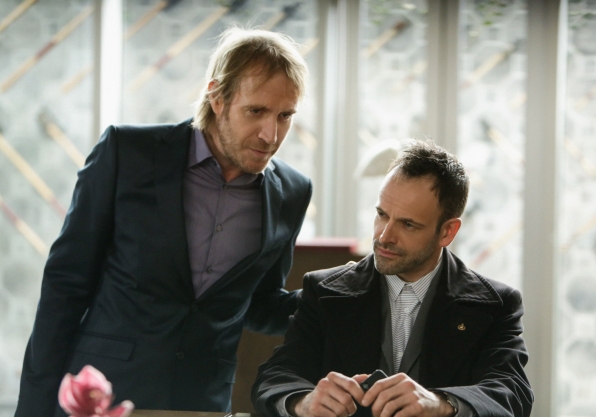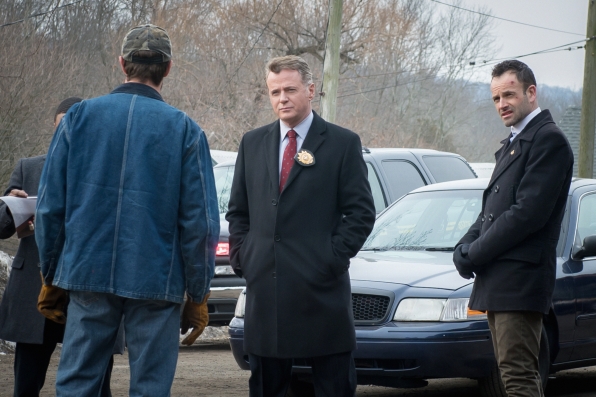This review is full of SPOILERS. Do not read if you haven’t seen the episode and want to remain the dark.
With only one episode remaining in Season 2 of Elementary, it was clearly time for the showrunners to reveal a couple key details about Mycroft. After spending an entire season violently changing my mind about the man, the writers treated us to that experience all over again in one 44 minute episode. It got dizzying. But it created so much excitement that I’m now buzzing for the finale.
It was clear since the beginning of season 2 that Mycroft and his relationship with Sherlock was going to be a cornerstone of the show, but it wasn’t really as clear how much canon would sneak its way in throughout. In fact, until this week it seemed very little about Mycroft’s true work would be shown in Elementary, but I’m both thankful and relieved that his bizarre behavior was indicative of not only his role in MI6, but done largely out of a need to protect Sherlock during one of his darkest times. This was perhaps the most deft change in the show this season.
In the final moments of last week’s episode, Joan Watson was captured by a frequent patron at Mycroft’s New York restaurant. She had discovered he was a wanted murderer and well, he’s a jerk, so he took her. As Holmes so clearly says at the beginning of the episode, “your very bad friends have taken my very good friend.” Mycroft and Sherlock are going to have to work together to get her back and the contempt could not be thicker.
This episode is meaningful for different reasons though. It’s the directorial debut for Lucy Liu, who deftly manages to create an intensity that clearly transitions us into the final two episodes of the second season. Liu has some shining moments as a director.
I would like to make a personal appeal to you today. If you…
Haven’t been watching Elementary.
Have been comparing every episode of Elementary to BBC’s Sherlock.
Have only watched the show with vague interest.
Is this you?

Pay attention. Turn on The Man With the Twisted Lip. Void your mind of any reference to Martin Freeman and Benedict Cumberbatch. Consider Doyle’s original stories and his creation of a character whose love of opiates both gives him a different perspective on the world and drags him into an underworld (both mentally and physically).
But most importantly… And this is worth bolding: Jonny Lee Miller and Lucy Liu are as effective a duo as any in the history of Doyle adaptations and it would be a shame to miss it.
Jonny Lee Miller is underrated. I understand that the Cumberbatch shadow is nearly as large as that of a 40 story sky scraper, but the man is killing it week after week on Elementary and no one is talking about it. Well, I am, I guess. In No Lack of Void, Miller shows us how he is evolving this character into something so much more than a consulting detective.

There’s definitely a crime to be solved this week, but the real point of interest for me is the death of Sherlock’s friend and dialect coach, Alistair. The character is so promising and one from canon, so I was hoping for a longer run. Plus, the idea of Holmes having a lifelong friend is so charming that it’s a real disappointment he’s dead and gone before we even had a chance to get to know him. Not only are we missing out on the chance to hear Holmes interpret a wide range of global accents, but we are deprived the privilege of seeing how Holmes would interact with someone teaching him.
So things got in the way of this review and for that, I apologize. You know, nerdy things, Sherlock things. 221B Con was a big success and I am better you’ll all love the live podcast from the Con in the weeks to come. Then there were the Shorty Awards, which we didn’t win, but were honored to be nominated for. Somewhere in there, Jonny Lee Miller attempted to understand how the same teeth could co-exist in many mouths at once.
When a pair of murders show eery similarities to what police thought was a previously solved case involving bite marks on victims, the entire history gets re-examined. And it also causes Joan to do some re-examining of her own. The man who had previously confessed to the bite mark murders, Aaron Colville, ended up on Joan’s operating table while she was still working as a surgeon. In the heated moments after he was stabbed, her residing surgeon let the man die, in Joan’s assessment, which causes her to feel slightly haunted by the concept of justice. Had he been innocent after all, he died for no reason. Ah, but Joan needn’t worry, because other moral quandaries of even greater confusion are about to wrap around her.